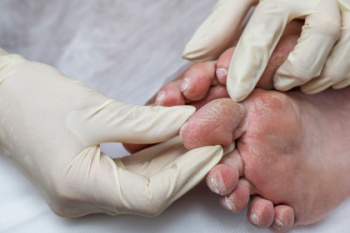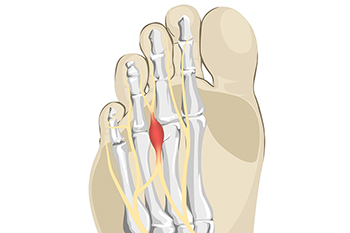September 2024
Causes and Prevention of Ankle Pain From Running

Ankle pain is a common issue among runners, often caused by several factors related to running dynamics. The pain can stem from overuse, wearing improper footwear, or poor running form. Repeated stress and impact during running can lead to inflammation of tendons or ligaments, resulting in discomfort. Wearing shoes that do not provide adequate support or cushioning may also contribute to ankle pain. To prevent these issues, choose an appropriate pair of running shoes designed for your foot type and running style. Strengthening exercises for the ankles and proper stretching can improve flexibility and stability. Additionally, incorporating rest days into your training routine allows your body to recover and reduce the risk of overuse injuries. If you have ankle pain from running, it is suggested that you visit a podiatrist who can treat it and offer additional running injury prevention methods.
Exercising your feet regularly with the proper foot wear is a great way to prevent injuries. If you have any concerns about your feet, contact Joseph D. Ruffo, DPM, PC of New York. Our doctor will treat your foot and ankle needs.
How to Prevent Running Injuries
Many common running injuries are caused by overuse and overtraining. When the back of the kneecap starts wearing out and starts causing pain in your knee, this is commonly referred to as runner’s knee. Runner’s knee is a decrease in strength in your quadriceps and can occur if you’re not wearing properly fitted or supporting shoes. To prevent runner’s knee, focusing on hip strengthening is a good idea, as well as strengthening your quads to keep the kneecaps aligned.
What Are Some Causes of Running Injuries?
- One cause of a common running injury is called iliotibial band syndrome.
- Plantar fasciitis is also another common injury.
- Stress fractures can occur from overtraining, lack of calcium, or even your running style.
Best Ways to Prevent Running Injuries
- Wear footwear that fits properly and suits your running needs.
- Running shoes are the only protective gear that runners have to safeguard them from injury.
- Make a training schedule. Adding strengthening exercises as well as regular stretching can help keep you strong and limber and can lessen the possibility of injuries.
- Stretching keeps muscles limber; this will help you gain better flexibility.
If you have any questions please feel free to contact one of our offices located in Sea Cliff and Babylon, NY . We offer the newest diagnostic and treatment technologies for all your foot and ankle needs.
A Guide to Types of Running Shoes

Selecting the appropriate running shoe is vital for both comfort and performance. There are several types to consider. Neutral running shoes offer balanced support and cushioning for those with a neutral gait. Stability shoes provide additional support for runners who overpronate or roll their feet inward excessively. Motion control shoes are designed for severe overpronation, offering maximum support and control. Trail running shoes feature rugged soles and enhanced traction for off-road conditions. When choosing the right shoe, consider factors like your foot type, running style, and the terrain you will be covering. It is also beneficial to try on different styles, as properly fitting shoes can prevent injuries and enhance your running experience. If you have endured a foot or ankle injury while running, it is suggested that you consult a podiatrist who can offer treatment options, in addition to guiding you on the right type of shoes to wear.
If you are a runner, wearing the right running shoe is essential. For more information, contact Joseph D. Ruffo, DPM, PC from New York. Our doctor can provide the care you need to keep you pain-free and on your feet.
Choosing the Right Running Shoe for Your Foot Type
To increase performance and avoid the risk of injury, it is important to choose the right running shoe based on your foot type. The general design of running shoes revolves around pronation, which is how the ankle rolls from outside to inside when the foot strikes the ground.
- Neutral runners are able to choose from a wide variety of shoes, including minimalist shoes or even going barefoot.
- Runners who overpronate, or experience an over-abundance of ankle rolling, should choose shoes that provide extra motion control and stability.
- Runners who underpronate, or supinate, have feet that have high arches and lack flexibility, preventing shock absorption. They require shoes with more flexibility and cushion.
If you have any questions please feel free to contact one of our offices located in Sea Cliff and Babylon, NY . We offer the newest diagnostic and treatment technologies for all your foot and ankle needs.
The Importance of Diabetic Foot Exams

A foot exam is important for preventing complications and maintaining foot health in individuals with diabetes. During the exam, a podiatrist will assess various factors to ensure early detection of potential issues. Key areas of focus include checking for any cuts, sores, or infections, as well as examining the condition of the skin for dryness, cracks, or fungal infections. They will also evaluate circulation by checking pulse levels in the feet and legs, and test sensation using a monofilament or tuning fork to detect any loss of feeling. Symptoms like persistent pain, swelling, or changes in skin color can indicate underlying problems that require attention. The exam may also include a review of footwear to ensure it provides adequate support and minimizes pressure points. To keep your feet healthy and address any concerns promptly, it’s suggested you make an appointment with a podiatrist for a comprehensive diabetic foot exam.
Diabetic foot care is important in preventing foot ailments such as ulcers. If you are suffering from diabetes or have any other concerns about your feet, contact Joseph D. Ruffo, DPM, PC from New York. Our doctor can provide the care you need to keep you pain-free and on your feet.
Diabetic Foot Care
Diabetes affects millions of people every year. The condition can damage blood vessels in many parts of the body, especially the feet. Because of this, taking care of your feet is essential if you have diabetes, and having a podiatrist help monitor your foot health is highly recommended.
The Importance of Caring for Your Feet
- Routinely inspect your feet for bruises or sores.
- Wear socks that fit your feet comfortably.
- Wear comfortable shoes that provide adequate support.
Patients with diabetes should have their doctor monitor their blood levels, as blood sugar levels play such a huge role in diabetic care. Monitoring these levels on a regular basis is highly advised.
It is always best to inform your healthcare professional of any concerns you may have regarding your feet, especially for diabetic patients. Early treatment and routine foot examinations are keys to maintaining proper health, especially because severe complications can arise if proper treatment is not applied.
If you have any questions please feel free to contact one of our offices located in Sea Cliff and Babylon, NY . We offer the newest diagnostic and treatment technologies for all your foot and ankle needs.
Heel Pain Can Be Treated!
Morton’s Neuroma Remedies

Morton's neuroma is a painful foot condition, where a nerve between the toes becomes thickened and inflamed. Morton’s neuroma often causes a burning sensation, tingling, or a feeling of a lump in the ball of the foot. This condition is commonly triggered by wearing tight shoes or high heels or by repetitive stress on the foot. Initial treatment focuses on relieving pressure on the nerve by switching to wider, more supportive footwear and using orthotic inserts to distribute pressure more evenly. Taking anti-inflammatory medication can help manage pain and inflammation. For persistent cases, corticosteroid injections or exercises may be recommended to reduce symptoms. In severe situations, surgical options might be considered to remove the affected nerve. If you suspect you have Morton's neuroma or are struggling with persistent foot pain, it is suggested that you make an appointment with a podiatrist who can provide specialized treatment tailored to your needs.
Morton’s neuroma is a very uncomfortable condition to live with. If you think you have Morton’s neuroma, contact Joseph D. Ruffo, DPM, PC of New York. Our doctor will attend to all of your foot care needs and answer any of your related questions.
Morton’s Neuroma
Morton's neuroma is a painful foot condition that commonly affects the areas between the second and third or third and fourth toe, although other areas of the foot are also susceptible. Morton’s neuroma is caused by an inflamed nerve in the foot that is being squeezed and aggravated by surrounding bones.
What Increases the Chances of Having Morton’s Neuroma?
- Ill-fitting high heels or shoes that add pressure to the toe or foot
- Jogging, running or any sport that involves constant impact to the foot
- Flat feet, bunions, and any other foot deformities
Morton’s neuroma is a very treatable condition. Orthotics and shoe inserts can often be used to alleviate the pain on the forefront of the feet. In more severe cases, corticosteroids can also be prescribed. In order to figure out the best treatment for your neuroma, it’s recommended to seek the care of a podiatrist who can diagnose your condition and provide different treatment options.
If you have any questions, please feel free to contact one of our offices located in Sea Cliff and Babylon, NY . We offer the newest diagnostic and treatment technologies for all your foot care needs.





